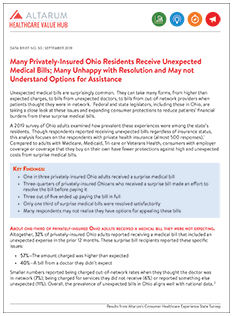Many Privately-Insured Ohio Residents Receive Unexpected Medical Bills; Many Unhappy with Resolution and May not Understand Options for Assistance
Unexpected medical bills are surprisingly common. They can take many forms, from higher than expected charges, to bills from unexpected doctors, to bills from out-of-network providers when patients thought they were in-network. Federal and state legislators, including those in Ohio, are taking a close look at these issues and expanding consumer protections to reduce patients’ financial burdens from these surprise medical bills.
A 2019 survey of Ohio adults examined how prevalent these experiences were among the state’s residents. Though respondents reported receiving unexpected bills regardless of insurance status, this analysis focuses on the respondents with private health insurance (almost 500 responses).1 Compared to adults with Medicare, Medicaid, Tri-care or Veterans Health, consumers with employer coverage or coverage that they buy on their own have fewer protections against high and unexpected costs from surprise medical bills.
About one-third of privately-insured Ohio adults received a medical bill they were not expecting. Altogether, 32% of privately-insured Ohio adults reported receiving a medical bill that included an unexpected expense in the prior 12 months. These surprise bill recipients reported these specific issues:
- 57%—The amount charged was higher than expected
- 40%—A bill from a doctor they didn’t expect
Smaller numbers reported being charged out-of-network rates when they thought the doctor was in-network (7%); being charged for services they did not receive (6%) or reported something else unexpected (11%). Overall, the prevalence of unexpected bills in Ohio aligns well with national data.2
Ohioans tried a number of strategies to address the surprise bill. About three-quarters (74%) of privately-insured Ohio residents who received a surprise bill made an effort to resolve the bill before paying it. As a first step, 27% of bill recipients contacted their doctor, hospital or lab and 25% contacted their insurance plan to resolve their unexpected medical bill (see Table 1).

Far fewer (38%) took more than one step to resolve their unexpected bill. And very few reported taking actions that would escalate the issue beyond the insurer, doctor or hospital, such as:
- Contacting a consumer assistance program
- Asking a friend of family member for help
- Contacting a state government agency
- Filing an insurance appeal
- Contacting an insurance broker
- Contacting state legislators or member of Congress
- Contacting a lawyer
- Filing a formal complaint
It is likely that many patients may not realize these avenues of appeal are open to them. The survey also asked about respondents’ confidence in the skills needed to navigate the healthcare system. Areas where Ohio adults particularly lacked confidence include disputing medical bills and resolving problems with unresponsive providers and health plans. Nearly 21% of Ohioans said they had low confidence about disputing a medical bill that they perceived as incorrect. These findings are consistent with other data showing that many adults have a poor understanding of how to navigate financial aspects of the healthcare system, and lack critical knowledge like knowing they have the right to appeal a coverage decision, how to seek help from state regulators and how to navigate hospital charity care policies.3
Among privately-insured Ohio adults with an unexpected medical bill in the past 12 months, three out of five (59%) paid the bill in full or through a payment plan. Just 12% had their bill dismissed and still fewer were able to negotiate a lower price (9%), while 9% of bill recipients had their surprise medical bill go to a collection agency and was still unpaid (see Table 2).

A third of unexpected medical bills were not resolved satisfactorily; many remain unresolved.Among privately-insured Ohio adults who had an unexpected medical bill, just about a third (32%) indicated that the issue was resolved to their satisfaction. Another third (31%) indicated that the issue was not resolved to their satisfaction and a quarter considered the issue unresolved (see Table 3).

Both satisfied and dissatisfied consumers reported attempting to contact the health plan or consulted their insurance policy or provider directory in high numbers when they received their unexpected bill. But satisfied consumers were likely to have tried additional strategies such as contacting a customer assistance program, while dissatisfied consumers more often paid the bill without disputing it (see Table 4).

Discussion
Privately-insured Ohio adults receive unexpected medical bills in high numbers. The nature of these bills takes many forms, from higher than expected charges, to bills from doctors they didn’t expect, to surprise out-of-network bills. Distressingly, about a third of these unexpected bills are not resolved to the satisfaction of the recipient. These Ohio findings are consistent with other national survey data showing unacceptably high rates of unexpected medical bills.
Data show that survey respondents tried to “do the right thing,” with three-quarters making an initial effort to resolve the unexpected bill by contacting the doctor, hospital or health plan. Very few respondents escalated their concerns to formal appeal channels.
Ohio residents would benefit significantly from state actions to alleviate these unfair and burdensome medical billing problems, starting with protections that prevent unexpected bills from happening in the first place.
As states address the issue of surprise, out-of-network medical bills, they are emphasizing the need to get the consumer out of the middle—strategies such as better consumer notices and prohibiting balance billing by providers in certain circumstances.4 When balance billing is prohibited, these consumer protections must be accompanied by a mechanism to resolve the out-of-network provider’s bill. Other efforts states are undertaking include simplifying health plan benefit designs5 and improving the accuracy of provider directories and adequacy of provider networks. In light of poll results showing that bill recipients may not understand how to escalate their billing problems, Ohio policymakers may also want to consider creating a dedicated state ombudsman’s office to help consumers with their billing problems, such as available in Connecticut and Vermont.6
Notes
1. These privately-insured respondents include those covered by plans regulated at the state level (“fully insured” plans), as well as plans regulated by the U.S. Department of Labor (ERISA or “self-insured” plans). The later are typically the plans offered by larger employers.
2. A Consumer Reports survey found nearly one third of privately insured Americans hit with surprise medical bills, Consumers Union (August 2018). https://www.healthcarevaluehub.org/files/4015/3756/0216/2018_Surprise_Medical_Bills_Survey_PUBLIC_Report.pdf. In addition, a Kaiser Family Foundation survey found that among insured, non-elderly adults struggling with medical bill problems, charges from out-of-network providers were a contributing factor about one-third of the time. A study by Stanford researchers found that 43% of visits to emergency rooms resulted in surprise medical bills.
3. A 2014 Kaiser Family Foundation survey found one-third of respondents did not know that if a health plan refuses to pay for a medically recommended service, an insured person has the right to appeal the plan’s decision. https://www.kff.org/health-reform/poll-finding/assessing-americans-familiarity-with-health-insurance-terms-and-concepts/. A separate 2015 survey found three-quarters of privately-insured adults are unsure if they have the further right to appeal to the state/an independent medical expert if their health plan refuses coverage for medical services they think they need. Few (just 13%) could identify the state agency/department tasked with handling health insurance complaints. https://consumersunion.org/research/surprise-bills-survey/
4. Kevin Lucia, Jack Hoadley, and Ashley Williams, Balance Billing by Health Care Providers: Assessing Consumer Protections Across States, Commonwealth Fund (June 13, 2017)
5. For examples, see Corlette, et. al,. Missed Opportunities: State-Based Marketplaces Fail to Meet Stated Policy Goals of Standardized Benefit Designs, Urban Institute (July 2016).
6. Hunt, Amanda, The Office of the Healthcare Advocate: Giving Consumers a Seat at the Table, Research Brief No. 25 (May 2018).







